Noor
Highlights
Historic Andalusian cuisine reborn with modern flair & two stars
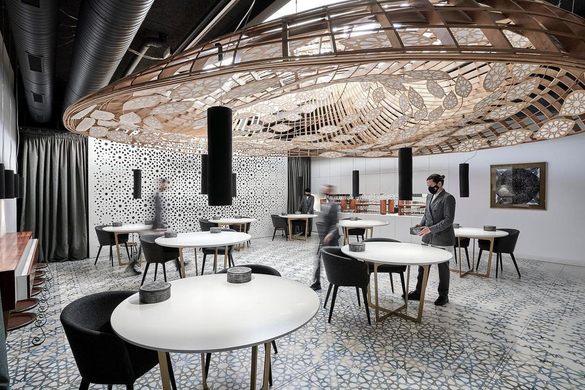
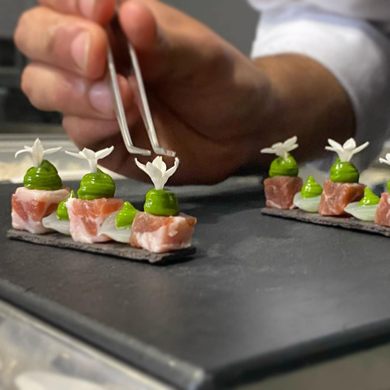
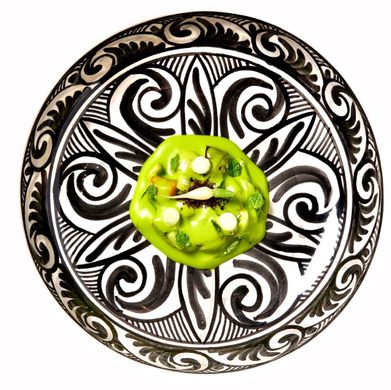

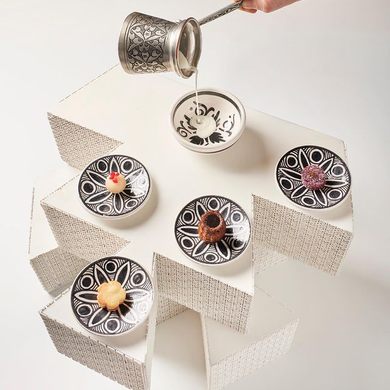
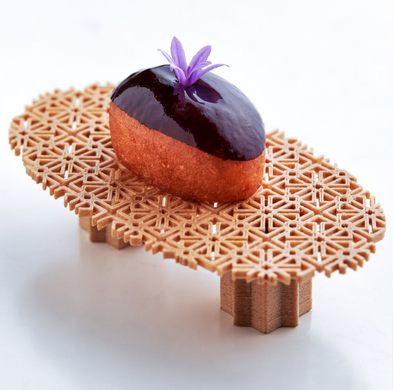



























Historic Andalusian cuisine reborn with modern flair & two stars
"Meaning “light” in Arabic, Noor is so much more than a fine-dining restaurant. Behind every detail there is a multi-faceted team that contributes its knowledge to bring to the fore the essence of the cultured and magical city of Córdoba, which has been a beacon of light since the reign of Caliph Abd al-Rahman III. In the restaurant's bright interior, with its open kitchen and incredible interior design, chef Paco Morales (ably supported by second-in-command Paola Gualandi) revives the spirit of Andalucian cuisine using modern ideas and techniques. Every season, the restaurant explores a different historical period, currently the Modern Age, which it calls “fin de ciclo” (literally “end of cycle”), taking us back to the 18C through three menus: Tanwer, Thawra, and Taqadum. Standout dishes here include the signature white sesame karim with ice-cream, green apple and desert caviar; durum wheat pasta with smoked butter, vegetable broth with brandy, and squid; and, for dessert, the carob tart in the shape of an eight-pointed star." - Michelin Inspector
"Noor, led by Paco Morales and Paola Gualandi, is a Three MICHELIN star restaurant located in the Cañero neighborhood of Córdoba. It offers a historical journey through fine dining influenced by Arab culture. Each season, a multidisciplinary team devises a new menu inspired by Andalusian history and perspectives. In the 2022-2023 season, they interpreted the assimilation of Hispano-Arabic cuisine, and in 2023-2024, they reinterpreted milestones of the gastronomic journey across Andalusia." - The MICHELIN Guide
"Of course, we are looking at a magnificent restaurant, although we must all go beyond culinary terms to see this establishment as an authentic “cultural project”. The chef, Paco Morales, is a master craftsman of cuisine, but with the distinctive feature of enriching this with details typical of an archeologist who, expertly assisted by a multi-disciplinary team, seeks to recover the historical essence of what Andalusian cuisine used to be. Every year, just like someone seeking to investigate a real temporal layer, he focuses on a set historical period, which has led him to create specific menus that have told us of the reigns of the Taifas in the 10th century, the califate, the Almoravid dynasty of the 12th century, or the Golden Age in the 16th Century by experimenting with the culinary connections to the new world. As such, going to his restaurant means tasting history through unforgettable mouthfuls." - Guía MICHELIN
"From around 700 to 1200, the Islamic-ruled Spanish city of Córdoba was a rare beacon of religious tolerance in Europe. During the Convivencia, as the period is known, Muslims, Jews, and Christians all coexisted in relative harmony. This cross-cultural exchange led to a flurry of intellectual and culinary flourishing. Moorish dishes, or those created by the Muslim inhabitants of the Iberian Peninsula, were often ornate affairs that drew on the vast array of spices and sweet-savory flavors of the Arab world. Yet when the fragile peace of the Convivencia shattered, following a series of conquests by Christian armies, many of these recipes slipped into obscurity or all but disappeared. Since 2016, chef Paco Morales has been recapturing some of the Spanish region of Andalusia’s gastronomic heritage at Noor, his two-star Michelin restaurant in Córdoba. Each summer, the restaurant closes for creative development, then reopens for a “season” inspired by a specific period in Andalusian history. With space for just eight diners at two daily seatings, one at lunch and one at dinner, Noor’s cuisine is a prized treat. For the restaurant’s inaugural season, Morales showcased tasting menus based on the Caliphate of Cordoba during the 10th century, while subsequent seasons have marched up through the 1300s. While the presentations are contemporary, each dish is grounded in rigorous historical research. In each case, Morales steers clear of ingredients from the Americas including corn, tomatoes, and potatoes, opting instead for rose petals, bitter coriander, dates, and nuts. Carob beans, for instance, often appear on the dessert menu in lieu of chocolate.An appreciation for Moorish history extends to the restaurant’s interior, which consists of materials available during the appropriate time period. Architectural studio GGLab loosely modeled the space’s intricate geometric motifs on those in Medina Azahara, a Medieval-era Muslim palace on the edge of the city. Noor translates as “light,” and the place is flooded with it, adding to the inherent drama surrounding menus that dive deep into Córdoba’s past." - ATLAS_OBSCURA

"From around 700 to 1200, the Islamic-ruled Spanish city of Córdoba was a rare beacon of religious tolerance in Europe. During the Convivencia, as the period is known, Muslims, Jews, and Christians all coexisted in relative harmony. This cross-cultural exchange led to a flurry of intellectual and culinary flourishing. Moorish dishes, or those created by the Muslim inhabitants of the Iberian Peninsula, were often ornate affairs that drew on the vast array of spices and sweet-savory flavors of the Arab world. Yet when the fragile peace of the Convivencia shattered, following a series of conquests by Christian armies, many of these recipes slipped into obscurity or all but disappeared. Since 2016, chef Paco Morales has been recapturing some of the Spanish region of Andalusia’s gastronomic heritage at Noor, his two-star Michelin restaurant in Córdoba. Each summer, the restaurant closes for creative development, then reopens for a “season” inspired by a specific period in Andalusian history. With space for just eight diners at two daily seatings, one at lunch and one at dinner, Noor’s cuisine is a prized treat. For the restaurant’s inaugural season, Morales showcased tasting menus based on the Caliphate of Cordoba during the 10th century, while subsequent seasons have marched up through the 1300s. While the presentations are contemporary, each dish is grounded in rigorous historical research. In each case, Morales steers clear of ingredients from the Americas including corn, tomatoes, and potatoes, opting instead for rose petals, bitter coriander, dates, and nuts. Carob beans, for instance, often appear on the dessert menu in lieu of chocolate.An appreciation for Moorish history extends to the restaurant’s interior, which consists of materials available during the appropriate time period. Architectural studio GGLab loosely modeled the space’s intricate geometric motifs on those in Medina Azahara, a Medieval-era Muslim palace on the edge of the city. Noor translates as “light,” and the place is flooded with it, adding to the inherent drama surrounding menus that dive deep into Córdoba’s past." - ATLAS_OBSCURA



